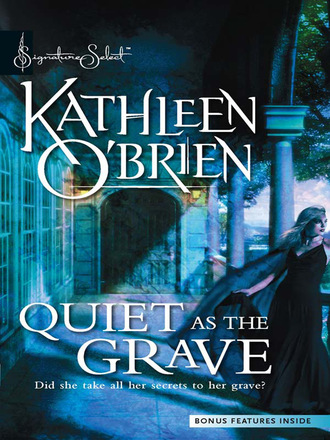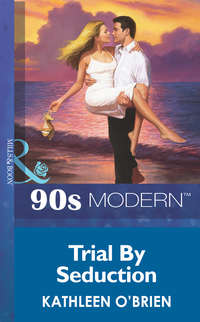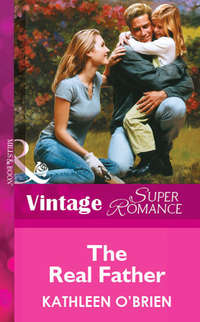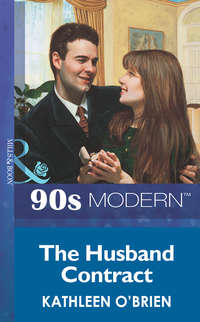
Полная версия
Quiet as the Grave
She opened her car door.
“Justine—”
“Stop the car.”
“Damn it, shut the door.”
“No. Stop the car. I’m getting out.”
He was already applying the brakes, but he had to be careful. She had one leg out. He didn’t want to fishtail on these narrow, curving roads. He was mad as hell at her. He might wish he’d never met her, but he didn’t want her to get hurt.
He maneuvered the car to a safe spot. His heart racing, he turned to her. “Are you insane? Do you want to kill yourself? Shut the damn door.”
She didn’t answer. She just picked up her purse and got out of the car, slamming the door shut behind her.
He rolled down the down the window. “Justine, for God’s sake.”
“Go to hell,” she said without looking at him. “Just go straight to hell where you belong.”
He looked at her, so messed up with contradictory, heart-racing emotions and adrenaline that he couldn’t even decide what he felt. It was about five o’clock, and the trees behind her were already full of shadows. She had on high heels, the better to impress the other Volunteer Mommies with, but no damn good at all for walking along an uphill cliff road.
“Justine. Okay, look. I’m sorry. Get back in the car.”
She didn’t even answer. She just began to walk.
He trolled along behind her for a few yards, leaning over to beg her through the window and steering the car with one hand. He felt like a fool, which was bad enough, but when another car came up behind him and honked impatiently, the embarrassment of it was just too much.
“Justine, get in the car right now, or I’m going to drive away, and you’re going to have to walk the rest of the way home. It’s nearly a mile.”
No response, except another short toot from the car behind.
“Justine, I mean it. It’s getting cold. I’m not coming back to get you.”
She didn’t even turn her head. She shifted her purse to her other shoulder and kept walking. The people behind him probably thought he was a stalker, or a serial killer.
Honk…
Well, screw her, then. If she wanted to walk all the way home in a snit, fine. She logged about five miles on the treadmill in the home gym every single day of her life. He figured she could handle half a mile out here.
He rolled up the window and hit the gas. He watched her in the rearview mirror, getting smaller but never once looking his way or acknowledging her predicament by the slightest twitch of a muscle.
Finally he came to a curve, and when he looked in the mirror again she was gone.
That was the last time anyone—except perhaps her killer—ever saw Justine Millner Frome alive.
CHAPTER TWO
Two years later
“HOLD STILL. You’ve got a spot of green paint on your face.”
Suzie Strickland waited while the man in front of her reached up and teased the bridge of her nose with his fingernail. She didn’t believe for a minute that she had any paint there. Ben Kuspit just wanted to touch her. He’d been flirting with her ever since she arrived an hour ago to take pictures of his son.
He was paying her four-and-a-half thousand dollars for a painting of Kenny, the youngest of his four kids. It was the largest commission she’d landed yet, and she needed it. Still, if they’d been alone, she would have made it very clear that the price didn’t include groping rights.
Unfortunately, nine-year-old Kenny was still in the room, and she was reluctant to embarrass Daddy in front of his kid.
And, to be fair, maybe Ben wasn’t inventing the speck of paint. She had been using viridian paint this afternoon as she finished up her current project, a pair of adorable two-year-old twins with green eyes, green dresses and green ribbons in their hair.
She’d come a long way since the early years, when, after a day’s work, she’d find splattered color everywhere. In her hair, under her fingernails, even on the soles of her shoes. She still painted with passion, but she’d learned how to harness that intensity. Today, her sunny workroom on the third floor of her Albany townhome was the cleanest, best-organized space in the house.
Still, paint was paint, and it had a way of insinuating itself into some pretty strange places.
“Thanks,” she said, smiling politely at Ben, though her voice was tight. He needed to back up. He was seriously violating her personal space. And that smile was gross. The man was fifty, for God’s sake. His kid was staring right at him.
She lifted her camera up between them and moved to the far side of a gold chair, the kind of fragile, frilly thing Mrs. Kuspit apparently loved. The huge room was full of them.
“I’ll just get two or three more shots, and then I think I’m done here.”
“Great.” Ben looked over at Kenny, who stood next to the living room mantel, where trophies were arrayed like a metallic rainbow, catching light from the overhead chandelier and tossing it onto the flocked ivory wallpaper in little oblongs of silver and gold. They didn’t match the frilly gold chairs, but apparently Mrs. Kuspit didn’t make all the decorating decisions.
“Hey, I’ve got an idea,” Ben said, snapping his fingers. “Kenny, pick up the football. Make like you’re getting ready to toss a long one.”
Kenny grimaced, but he bent down and retrieved the football at his feet. He lifted his arm awkwardly, glancing sideways at his father. “Like this?”
Ben made a disgusted sound. “Damn it, Kenny, why are you flashing us your armpit?” He strode over to the boy and began twisting his skinny elbow into a better position. “If you think I’m paying four-and-a-half thousand dollars to have you look like a geek, you’ve got another think coming.”
The boy flushed, but he didn’t protest. He just stared at the floor while his father adjusted him like a mannequin. Suzie lowered her camera and tried not to hate the man. Throwing a football in the formal living room? Come on. His ego had to have some limits, didn’t it?
She didn’t say anything, though. She’d had weirder requests, like the woman who wanted her parakeet’s picture painted as if he lived inside a genie’s bottle. She’d like to meet the psychiatrist who could figure that one out.
She had taken that commission, too. She needed every job she could get. If the Kuspits liked her painting—and she could already tell she’d have to add about ten pounds of muscle to the little boy in order to please Daddy—they would hang her picture where their rich friends could see it.
Their rich friends would then decide that their own little darlings deserved to be displayed in a big, beautiful rococo gold frame, too.
And voilà! Suzie could pay the mortgage on her town house, and everyone was happy.
Except Kenny.
Poor kid.
Ben was big and beefy, a good-looking former athlete. Kenny was scrawny and appeared to have about as much athletic ability as a scarecrow. Most of the trophies on the mantel were inscribed with phrases like Most Improved or Best Sportsmanship.
“Okay, that’s good, hold that. Don’t move.” Ben gestured impatiently toward Suzie. “Get one of him like that.”
Suzie lifted the camera, although the image she saw in the viewfinder was hardly inspiring. Kenny looked like he was being tortured.
He must hate football, but Ben obviously didn’t care. The three older Kuspit offspring were girls. Suzie would bet that, the minute Ben saw the little manly splotch on the ultrasound, he had scrawled “live vicariously through my son, the awesome high school quarterback” into his engagement calendar. He wasn’t going to let the dream die easily.
If he only knew what a mistake he was making. Look at Mike Frome, the most “awesome” jock in Suzie’s high school. At seventeen he’d landed Justine Millner, the prettiest girl in Firefly Glen. By eighteen, he’d been forced to marry Justine—because she’d had his kid—though he no longer even liked her. By twenty-five they were divorced.
Not that Suzie was keeping tabs on his life or anything. She knew all that only because, right after the divorce, Justine had hired Suzie to paint her son Gavin’s portrait.
It had probably merely been Justine’s way of spending Mike’s money as fast as she could, but Suzie didn’t care. She would have taken a commission from the devil himself to jump-start her career. And Gavin had actually been a pretty neat kid in spite of having been scooped out of a scummy gene pool.
“Suzie?”
She focused again, and saw both Ben and Kenny in her viewfinder. Ben was frowning. “Suzie? Is everything okay?”
Darn. It had been a long time since she’d let thoughts of Mike Frome distract her.
She pressed the camera’s button automatically, forgetting that she’d now have both father and son in the picture. No big deal. She often picked up all kinds of extraneous people and things. She could drop them out with her photo program.
“Yeah, fine. I think that’ll do it.” She smiled at Kenny. “You did great.”
Kenny looked skeptical, but he smiled back and shrugged. He turned to his father. “Okay if I go? I’ve got homework.”
Ben patted him on the shoulder. “You bet. Gotta get those grades up.”
God, could the jerk put any more pressure on this kid? Suzie began packing away her camera and supplies, reminding herself to schedule the sittings when Ben Kuspit was at work. He did go to work, didn’t he? Surely plaguing the hell out of your family wasn’t a full-time job.
“Ready?” Suddenly Ben Kuspit’s voice was very close behind her.
Oh, rats. She’d forgotten that she’d agreed to let him drive her home. Her twelve-year-old Honda, which she’d named Flattery because it wouldn’t get you anywhere, had hunkered down in her driveway and refused once again to start. She’d taken a cab over here, but Ben had insisted on driving her home.
Suddenly she didn’t like that idea at all.
“You know,” she said, turning, her camera still in her hand, “I think I should get a cab back. This took longer than I’d expected, and I know you have things to do.”
“No, no,” he said with a smile. That smile. He caught his full lower lip between his teeth in a way that would have looked stupid even on a man half his age. “There’s nothing I’d rather do than take you home. Honestly.”
Oh, yeah? Well, honestly, the idea of getting in a car with you makes my skin crawl.
Somehow she kept the smile on her face, though she was getting downright sick of this guy.
She thought of the Sailor Sam’s Fish and Chips uniform she’d hung above her easel as a reminder of what life used to be like. A reminder that she was always just a couple of blown commissions away from having to wear that blue sailor jacket, tight red short-shorts, kneesocks and jaunty red-ribboned cap.
She took a deep breath. “No, it’s okay. I’d really rather take a cab.”
“Don’t be silly.” He reached into his pocket and jingled his keys suggestively. “I insist.”
“Mr. Kuspit, I don’t think you understand. I want to take a cab.” She smiled to soften it. “I’m going to take a cab.”
He must be really rich, she thought. He looked as if he’d never heard the word no before. He gave her a playful scowl and came even closer, so close it made the hair on her arms stand up and tingle.
Cripes. Maybe she should go back to the Goth style she’d adopted in high school, the unflattering, chopped-off purple hair and the black, slouchy clothes. Passes from boy-men had never been such a nuisance back then.
“But I’ve been looking forward to it,” he said in a throaty voice. “I’m eager to get to know you better, Suzie. You’re such a talented young woman.”
Oh, man, she really, really didn’t like people invading her space, and this guy was so close she could see the tiny broken veins around his nose. If she were painting his face, she’d need a whole tube of cadmium red.
A drinker. Great. She needed that.
She tried one last time to be smart, to remember the mortgage payments. Would it kill her to ride in the car with the guy one time? Her town house was only ten minutes away. She thought of the red short-shorts and the screaming kids who puked up tartar sauce on the tables. She thought of the way she had come dragging home every night, too tired and angry to paint.
He touched her arm. Still smiling, he ran his index finger slowly up, until it disappeared under the little cap sleeve of her T-shirt. She shivered in disgust, and she saw his gaze slip to her nipples.
Oh, no, you don’t, buddy. Waaay over the line.
She narrowed her eyes.
“I’m sorry, Mr. Kuspit. I guess I didn’t understand exactly what you wanted. The portrait is forty-five hundred. But if you’re expecting to have a thing with me on the side, that’s going to cost extra.”
He blinked once, but then his grin twisted, and his fingers crept up another inch. They found her shoulder and cupped it. What an incredible sleazeball! He thought she was playing games.
“Oh, is that so?” He raised one eyebrow. “How much extra?”
She scrunched up her mouth and made a low hum of consideration. “Let’s see,” she said. “I’d say…oh, about…no…well, let’s see…”
She looked him straight in the eye. “Oh, yeah, now I remember. There’s not enough money in the world.”
His brows dived together. His hand tightened on her shoulder and pulled her in, and his other arm started to come up. She didn’t stop to find out what he had in mind. She swung out with the camera as hard as she could.
He was so close she couldn’t get much leverage. Still, the camera connected with his cheek and made a nice little thump, followed by a grunt of shocked outrage.
“Shit,” he said, recoiling. “What the hell’s the matter with you?”
She didn’t bother to answer. He was holding his cheek, looking at her as if she’d broken his jaw, which she definitely had not. She knew what that sounded like. She’d broken a bone once, the left radius of a university teaching assistant who’d thought he could teach her something more than algebra and had to be set straight the hard way.
This guy wasn’t hurt. He was just a big baby.
She reached out, lifted his hand from the cheek and eyed it calmly, pleased to see she’d drawn at least a little blood. He’d have a nice colorful bruise there tomorrow.
She felt like blowing smoke from the tip of her camera, gunslinger style. But that would have been gloating.
Still, she was pleased to discover that, even after ten years of learning to play nice and conform, she hadn’t lost her touch entirely.
It wasn’t until she was halfway home in the cab that she realized what she had lost.
She leaned her head against the cracked vinyl seat and let out a groan.
Blast it. She’d lost four-and-a-half thousand dollars.
DEBRA PAWLEY DECIDED to go over to the Millner-Frome mansion a couple of hours early so that she could make sure everything was spiffed up and gleaming for the open house at noon.
She was by God going to sell this house today.
Tuxedo Lake was one of the most desirable communities in this part of upstate New York. It was about thirty minutes northeast of Albany, just close enough to be considered a bedroom community…if you didn’t plan to sleep late.
The lake itself was big and elegant, with sandy shores you could get away with calling a beach in your brochures. A picturesque ring of low granite cliffs nearly circled the lake, and if a sailboat drifted by at the right moment, your brochure illustration looked dynamite.
The mansion itself was gorgeous. A 6,462-square-foot French château jewel, complete with marble vestibule, formal library, swimming pool with central fountain and Jacuzzi. Nanny quarters over the four-car garage.
Debra didn’t often let herself envy the houses she listed. But she envied this one.
When she sold it, she’d make a bundle in commission.
If she sold it. The house might be perfect, but the house’s history was a mess. Justine Frome had mysteriously disappeared two years ago and had never been heard from since. The police suspected foul play, and so did her parents. Justine’s father had dragged the lake and jackhammered up the swimming pool looking for her, but no body had ever been found.
That was the problem in a nutshell. Debra didn’t mean to be insensitive, but who wanted to pay a couple of mil for a beautiful lakefront home if they were always going to be wondering when a body might bob out of the lake, or start stinking up the basement?
She left her car out on the street, planted her Open House sign in the most visible spot and then hiked up the long, showy entry to the mansion. She liked to let the buyers drive into the main portico. It tempted them. They loved the look of their own cars under that elegant, shady arch.
Please, God, let there be buyers today. Her last open house had brought in half a dozen gawkers and only two legitimate lookers who had scurried out of the house like cartoon mice when they heard the Where’s Justine? story. Legally, she had to tell it.
Debra propped her bag of cleaning and cooking supplies against her shin while she fumbled with the front door keys. Off to the right, she heard the growl of Richie Graham’s hedge clippers. He was probably shaping the boxwood hedge, which surrounded a glorious garden of White Persian Lilacs. They probably would be in full bloom thanks to all the rain.
Richie…well, that was a good news–bad news situation. Richie had been the gardener for this house, and many of the Tuxedo Lake mansions, for about ten years now, and he created some spectacular lawns. He’d lived in the nanny quarters, serving as caretaker for the mansion ever since Justine’s father, Alton Millner, had moved out a few months ago.
He was as scruffy, rugged and sexy as Lady Chatterley’s lover, which was the good news. Debra had watched the female prospective buyers watching Richie, and several times she’d been tempted to hand them one of the Chinese lacquer bowls to catch the drool.
The bad news was that he was terrible about tracking mud all over the marble floors, especially when the weather was as soupy as it had been lately.
The hedge clippers stopped just as she got the dead bolt to turn. In a matter of minutes, as she was arranging her supplies on the kitchen’s granite counter, she felt a shadow fall into the room, and she knew Richie had arrived.
“Hey, there, gorgeous,” he said in his husky voice that always seemed to be laced with amusement.
He might well be amused by that comment. Debra knew she wasn’t gorgeous. She wasn’t even really pretty. She was, as her mom put it, “acceptable.”
It had been a hard lesson to learn, but she’d learned it. She’d even learned to compensate for it, though good makeup and a flattering haircut could go only so far.
“Hi, Richie,” she said, twisting her head to smile at him.
Now he was gorgeous. He was wearing his regular uniform, a pair of white jeans that somehow managed to cup his butt and practically fall off his bony hips at the same time. Work boots. And nothing else.
She wondered if he picked white because he knew that, on him, smudges of earth were paradoxically sexy, making you think he might grab you and make painful, thorny, but ecstatic and perfumed love to you in the rose garden.
Or did he just know that the white set off his tanned torso to perfection? Once, hiding here in the kitchen and looking out the window, she’d watched him hose off his dirty chest, the clear water finding that fault line down the center, the one that bisected the pectorals and ended at the navel….
She wiped her flushed brow with the back of her hand and wished that she weren’t always, always attracted to bad boys.
“You showing the place today?”
She nodded, pulling herself together. She already had one bad boy lover. She didn’t need two, not even in her fantasies.
“Yes. It starts at noon. I hope you haven’t tracked mud all over the foyer.”
“I might have.” He rubbed his chest lazily, still grinning. “It’s rained every day for two weeks. It’s like a swamp out there.”
She sighed, reached over and grabbed a damp sponge.
“Here,” she said, tossing it to him. “You can clean it up, then.”
He caught the sponge with one hand. He looked at it a minute, then squeezed it hard, until water oozed between his fingers. He rubbed it slowly over his face, and then, when it was gray with dirt, he tossed it back to her.
“Can’t,” he said. “The boxwood is only half-done. Gotta get back to it. I’ll help you with that gingerbread when you’re done. Just leave it in the stove.”
She made a face, but she wasn’t really mad. She didn’t mind if he wanted the gingerbread. She made it only to fill the air with the comforting scents of cinnamon and nutmeg during the open house.
And she didn’t even mind that he wouldn’t clean up his own muddy footprints.
That was her problem. She simply didn’t know how to get mad at a sexy rascal like that, even when he deserved it. It was, as her mother was fond of pointing out, her Achilles’ heel.
Turned out Richie had been pulling her chain anyhow. The house was spotless, and the little touch-cleaning she did was largely unnecessary. She opened a couple of windows to let the fresh spring air in. Then she dusted a couple of picture frames. Finally, she vacuumed the library’s Persian rug and the plush wall-to-wall in the master bedroom.
Done. And still an hour to go before anyone showed up. She was going to sell this house, she told herself again. Her mom had called last week and offered to let her come home to live if things got too tough up here in New York.
No way in hell was she going back home. She’d sell this house today.
Still in the master bedroom, she gazed through the lake window that led onto a small, circular overlook. From up here you could see the entire lawn. Richie was still taming the boxwood, his muscular arms hoisting the heavy clippers as if they were made of feathers.
On the other side, the west side of the house, she could just glimpse Phil and Judy Stott’s yard. They didn’t use Richie, and it showed. They were out there now, fertilizing a bulb garden that was just about played out for the season. Debra and Judy were friends, but she was glad you couldn’t see much of their yard from the ground. It wouldn’t be a selling point.
The glistening blue lake was, though, especially on a clear morning like this, when half a dozen sailboats floated out there, as white as scraps of fallen clouds.
Thank God the torrential rains had ended. Debra had been here in bad weather, and it gave the lake an eerie silvery-green cast. On stormy days, you could imagine poor Justine lying there on the mucky bottom, small fish camouflaging themselves in the waving strands of her faded hair.
What had happened to her?
This tiny balcony, for instance… The wrought-iron railing was too low. If she’d been standing here, and someone had come up behind her, it wouldn’t have taken much. One push, and she could easily have lost her balance.
But who would have pushed her? The most obvious answer, of course, would be her husband, Mike Frome. And Debra knew that wasn’t possible.
Her boyfriend, Rutledge, worked for Mike. Mike was one of the good guys.
At least she had always thought he was….
She moved away from the window. None of that. She needed to fill this house with good vibes, with optimism and promise. She spied an empty cachepot beside the bed. Yes, that’s what it needed. Flowers. Nothing said “home” like flowers fresh from your own garden.
She grabbed a basket and a pair of gardening shears from the mudroom just beyond the kitchen, and then she wandered out into the yard. Richie hadn’t been kidding. It really was swampy. But it was as if the rain had intoxicated the flowers, eliminating their inhibitions, making them dress in gaudier colors, spread their lush, ripe petals wider than was prudent.
The larkspurs were the most spectacular. They dominated a multicolored patch of blooms down near the cliff edge, flanking the small stairway that led to the beach. Debra decided she had time to go that far and still wash her shoes when she got back to the house. So she settled the basket over her arm and made her way down the sloping lawn, enjoying the way the sun warmed her hair and painted lime-gold patches on the grass.











